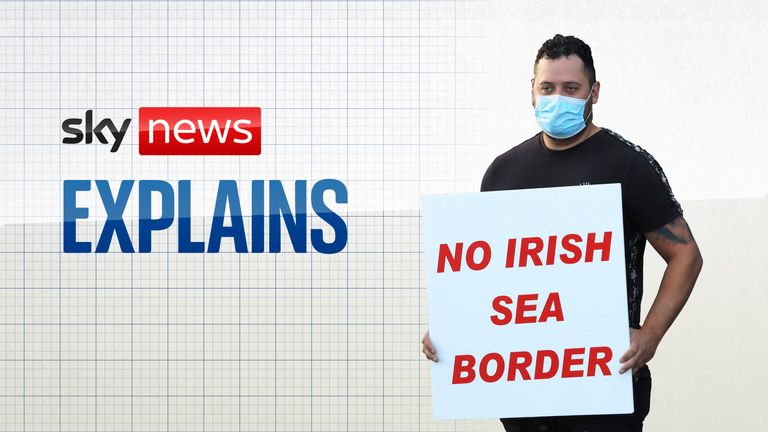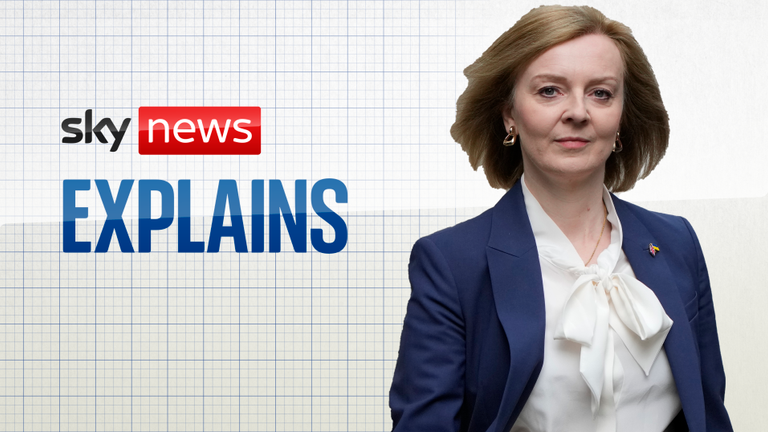Boris Johnson’s legislation to scrap parts of the Northern Ireland Protocol has cleared its first Commons hurdle.
The bill passed by 295 votes to 221 despite attracting fierce criticism from a number of MPs on the Tory benches as well as the opposition.
Critics, who include former prime minister Theresa May, say the plan is illegal and threatens to spark a trade war with Europe.
The bill must now go through in-depth scrutiny by MPs and a further Commons vote and then pass to the Lords, before becoming law.
Politics Hub: Cabinet ministers urged to oust PM
Earlier, Mrs May delivered a stinging rebuke to Boris Johnson’s plan to override parts of the protocol.
The former prime minister told fellow MPs she could not support the controversial legislation – which she said would be illegal, fail to achieve its aims, and diminish Britain’s standing in the world.
In an excoriating takedown of the plans, she even drew on her own experience as an embattled prime minister to suggest that European leaders may now be doubtful about her successor Mr Johnson‘s future in Downing Street.
The protocol, which governs Northern Ireland‘s post-Brexit trading arrangements, was designed to prevent the return of a hard border with the Republic of Ireland.
But it means some goods being exported from mainland Britain to Northern Ireland are subject to customs checks, creating problems for some businesses and upsetting unionists – resulting in political deadlock as the DUP refuses to re-enter power-sharing.
The UK government says it wants to renegotiate the deal, but accuses Brussels of intransigence and claims that it has no choice but to introduce legislation.
It contains measures to remove checks on goods and animal and plant products exported from Great Britain to Northern Ireland.
Read more: What is the Northern Ireland Protocol, and why does it matter?
‘Is it worth negotiating with these people?’
Foreign Secretary Liz Truss told MPs preparing to vote on the legislation on Monday that the political situation cannot be allowed to drift and that the plan was “both legal and necessary”.
But Mrs May said that was wrong, because other legal options such as continuing to negotiate and to invoke Article 16 – unilaterally suspending parts of the protocol temporarily – remain available.
She added that key aims of the legislation – bringing the DUP back into government and encouraging Brussels to negotiate – were also doubtful.
She said when she, as prime minister, had faced a bruising confidence vote just like Mr Johnson, EU negotiators started to ask themselves: “Well, is it really worth negotiating with these people in government because will they actually be there in any period of time?”
She added: “Also, actually, I suspect they are saying to themselves why should they negotiate in detail with a government that shows itself willing to sign an agreement, claim it is a victory, and then try to tear part of it up in less than three years’ time.”
Read more: What is power-sharing, and why is it used in Northern Ireland?
Truss and May clash over ‘patriot’ status
Ms Truss said she was supporting the measures as she was a “patriot”, but Mrs May said: “As a patriot, I would not want to do anything that would diminish this country in the eyes of the world.
“I have to say to the government, this bill is not, in my view, legal in international law, it will not achieve its aims, and it will diminish the standing of the United Kingdom in the eyes of the world, and I cannot support it.”
Follow the Daily podcast on Apple Podcasts, Google Podcasts, Spotify, or Spreaker
PM defends government’s plan
Meanwhile, the prime minister has said the legislation could be enacted “very fast” if backed in parliament.
Brussels has launched legal action against the UK in retaliation to the proposed legislation, which would effectively ditch key parts of the deal signed by Mr Johnson and the EU in 2019.
European Commission vice president Maros Sefcovic has indicated further measures could follow if the UK pressed ahead with the bill.


